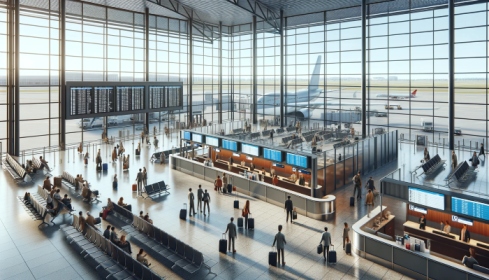Sunday, September 8, 2024 Artificial Intelligence (AI) has made significant strides across various industries, and the tourism sector is no exception. With the continuous development of digital technologies, AI-Powered is becoming an integral part of how tourism companies enhance their services, optimize operations, and deliver personalized experiences to travelers. This article delves into the growing role of AI in tourism, exploring its benefits and highlighting how it is shaping the future of the industry.
AI’s ability to analyze vast amounts of data is revolutionizing how tourism companies interact with travelers. By collecting and processing data on traveler preferences, behaviors, and past choices, AI enables companies to offer highly personalized experiences. Whether through destination suggestions, activity recommendations, or customized itineraries, AI tailors every aspect of travel to the individual’s needs.

AI-powered chatbots have also become a cornerstone of customer service in tourism. These intelligent systems provide instant, round-the-clock support, answering queries, managing bookings, and addressing customer concerns without the need for human intervention. This level of responsiveness significantly enhances customer satisfaction by providing seamless and efficient communication throughout the travel process.
In addition to enhancing customer experiences, AI plays a pivotal role in optimizing pricing strategies and managing revenue in the tourism sector. Advanced AI algorithms monitor fluctuations in demand, analyze special events, and assess market conditions to dynamically adjust prices for tourism services such as flights, accommodations, and tours. This real-time price optimization ensures that businesses can maximize their revenue while offering competitive pricing to travelers.
AI’s ability to forecast demand and trends also helps tourism companies manage resources more effectively. By predicting when and where services will be most needed, AI allows for better allocation of staff, inventory, and other resources, minimizing waste and improving operational efficiency. Operational efficiency is a crucial factor in the success of any tourism business, and AI is making significant contributions in this area.
AI systems assist with route planning, logistics management, and booking processes, ensuring that services run smoothly and efficiently. Whether it’s optimizing flight routes, streamlining hotel check-ins, or automating reservation systems, AI minimizes human error and reduces costs, leading to a more seamless experience for both businesses and travelers. Safety and navigation are other areas where AI has proven invaluable.
AI-driven systems provide real-time information on traffic conditions, weather updates, and local events, helping tourists navigate unfamiliar destinations with ease. Additionally, AI-powered facial recognition and biometric systems are improving security measures at airports, hotels, and other facilities, enhancing the safety of travelers while simplifying check-in procedures. Artificial Intelligence is also driving innovation in the realm of immersive travel experiences through technologies like augmented reality (AR) and virtual reality (VR).
These tools allow travelers to explore destinations virtually before booking their trips. Whether it’s a virtual tour of a hotel, a walk through a tourist attraction, or an interactive travel guide, AI-powered AR and VR applications are making trip planning more engaging and informed. This immersive technology helps travelers make better decisions about where to go and what to do, ultimately leading to more satisfying travel experiences.
It’s particularly beneficial for destinations looking to stand out in a competitive market, offering potential visitors a unique preview of what awaits them. AI is not only transforming customer service and operational efficiency but also improving security within the tourism industry. AI-driven facial recognition and biometric systems are becoming more widespread in airports, hotels, and tourist sites, providing an added layer of security while streamlining processes.
These systems enable faster, more efficient check-ins and ensure that safety protocols are adhered to without causing inconvenience to travelers. Real-time data analysis powered by AI also allows tourism companies and authorities to monitor and respond to safety concerns quickly. From providing up-to-date information on traffic conditions and weather to offering safety recommendations, AI helps ensure a safer travel experience.
Several companies in Latin America and beyond are leading the charge in integrating AI into the tourism sector. AI technologies are being widely adopted by airlines, hotels, travel agencies, and other service providers to enhance customer satisfaction and streamline operations. For example, airlines use AI for dynamic pricing and optimizing flight routes, while hotels are implementing AI-driven concierge services that offer personalized recommendations to guests.
Major global players like Expedia and Booking.com have also embraced AI to provide personalized travel experiences, making it easier for users to find accommodations and activities tailored to their preferences. In Costa Rica, various tourism companies are utilizing AI to attract a broader audience by offering personalized travel experiences and implementing AI-driven technologies in customer service and operations.
This trend is part of a broader movement within the region as Latin American tourism companies continue to adopt innovative technologies to stay competitive in the global market. As AI continues to evolve, its role in the tourism industry is expected to grow even more prominent. With ongoing advancements in machine learning, natural language processing, and predictive analytics, AI will become an indispensable tool for tourism companies looking to improve the overall traveler experience while boosting operational efficiency.
The potential for AI to reshape tourism is vast. As AI becomes more integrated into every aspect of the travel industry, travelers can expect even greater levels of personalization, safety, and convenience. From fully automated booking processes to real-time travel recommendations and enhanced security, AI is set to redefine how the world experiences tourism.
The integration of AI in the tourism sector is not just a trend—it’s a revolution that is transforming the industry from the ground up. From personalized customer experiences to optimized pricing and improved operational efficiency, AI is playing a vital role in reshaping how tourism companies operate and how travelers explore the world. As AI technology continues to advance, the future of tourism will undoubtedly be one where human creativity and cutting-edge technology work hand in hand to deliver exceptional travel experiences.
.



















